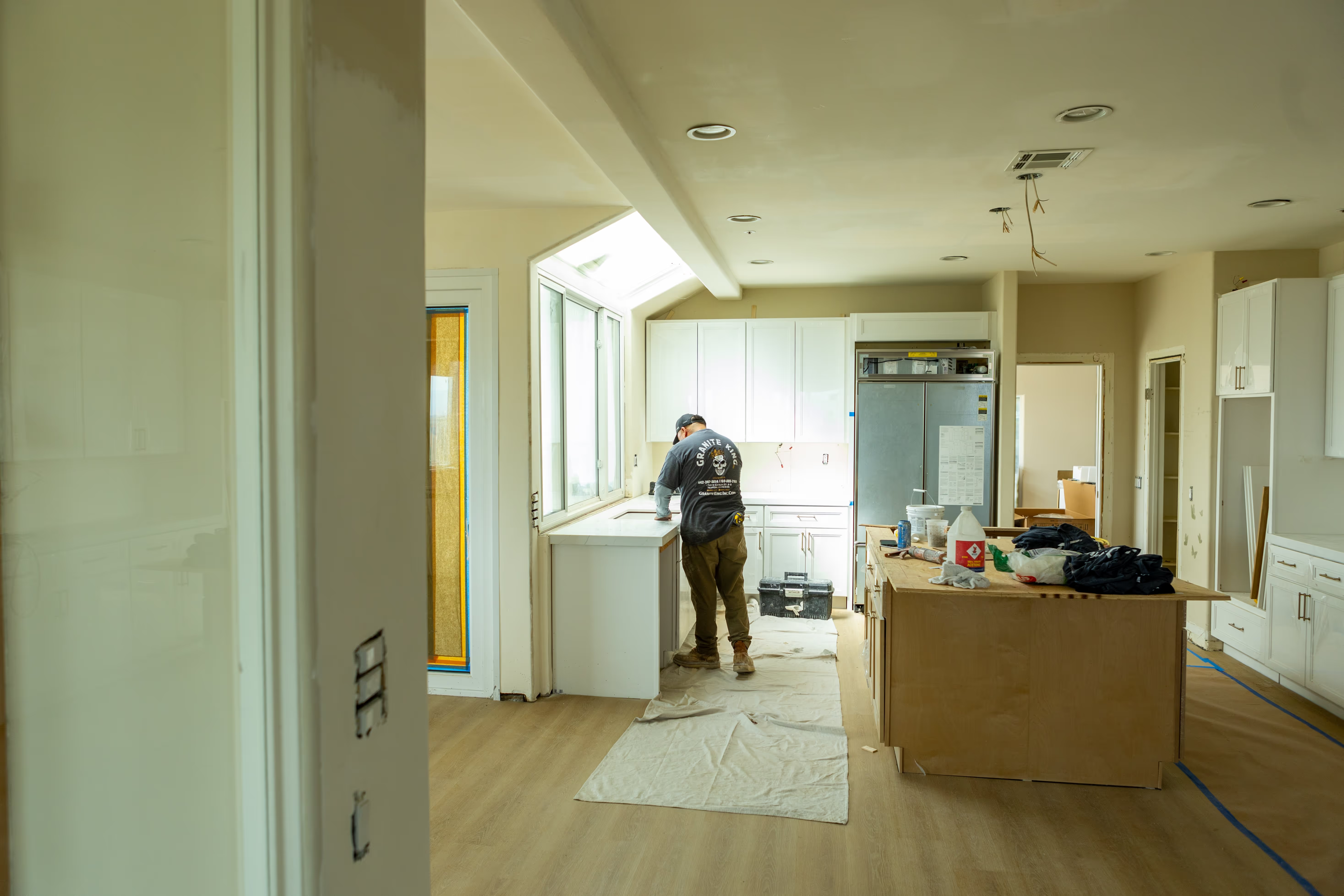San Jose Building Permits You Should Know About for Your Home Renovation Project

Find out which home projects need a building permit in San Jose. Learn about permit costs, timelines, and how to apply online for a smooth renovation process.
San Jose Building Permits You Should Know About for Your Home Renovation Project
As a homeowner in San Jose, planning renovations that enhance your home's functionality is a practical decision. Familiarizing yourself with building permits ensures compliance and supports a successful outcome.Permits confirm that work meets established safety and quality standards, which provides clear documentation for your records.
This guide provides the information you need to proceed with clarity, helping you make informed choices that align with your goals.nUnderstanding the process from the start allows you to anticipate requirements, budget accurately, and coordinate contractors effectively. When renovations are done correctly with proper approvals, they contribute to a home that functions better.
What Requires a Building Permit in San Jose?
Understanding permit requirements gives you a clear path to plan effectively. Permits maintain safety and code compliance, protecting your property and its occupants.They also ensure that modifications align with local zoning and building standards, which becomes important for insurance coverage and documentation. Here is a clear overview of the main categories, with practical examples relevant to common home renovations.
Residential and commercial construction typically requires permits for new structures or expansions. For your home, this includes additions like rooms, garages, or accessory dwelling units. These projects often change the building's footprint or height, so the city reviews them for compliance with zoning rules, including setbacks from property lines, maximum lot coverage, and height restrictions. For example, adding a primary suite or a detached office space falls here.This review process verifies drainage, foundation stability, and integration with existing utilities. Clarity in these requirements empowers you to make smart decisions early.
Electrical, plumbing, and mechanical work needs permits to ensure safe installations. This covers updates to wiring, fixtures, or heating systems. Common examples include upgrading an electrical panel to support modern appliances, installing new circuits for home office equipment, adding bathroom plumbing, or replacing an HVAC unit. For renovations involving kitchens or bathrooms, obtaining approval confirms reliability and prevents issues like leaks or overloads. Even smaller tasks, such as adding recessed lighting or a tankless water heater, typically require review to meet energy efficiency and safety codes. This knowledge protects your investment and helps you plan with certainty.
Remodels, additions, and structural changes require permits for alterations beyond cosmetic updates. Examples include removing load-bearing walls to create open floor plans, modifying roofs for better insulation, or reinforcing foundations in older homes. Minor tasks like painting, flooring replacement, or cabinet installation often do not need one, but structural work does. Replacing windows or doors may require permits if sizes change or energy standards apply. To avoid surprises, review your plans early to identify necessary approvals. This step prevents work stoppages and ensures modifications enhance livability without compromising integrity. You gain control through this proactive approach.
Sub trade permits (plumbing, electrical, mechanical) address specific systems. These may be separate or part of a broader permit. Licensed professionals often manage them, but you oversee the process to ensure completeness. For instance, a kitchen remodel might involve a main building permit plus separate electrical and plumbing approvals for new outlets and gas lines. Coordinating these details maintains project momentum and results in systems that perform reliably over time.
Identifying these requirements in advance allows you to allocate resources wisely, supporting a renovation that meets your expectations. Understanding permit needs early lets you avoid delays, stay compliant, and protect long-term value.
San Jose Building Permit Requirements
Permit requirements give you clear guidelines for safe and compliant projects. Knowing them prepares you to submit a thorough application and reduces the need for revisions. San Jose follows the California Building Standards Code with local amendments, focusing on seismic safety, energy conservation, and fire protection. These elements matter in the Bay Area context. This structure gives you transparency to unlock your project's potential.
The scope of work determines needs. Surface-level changes like cabinet replacements without utility adjustments may not require permits, while structural or system modifications do. Smaller additions or remodels can follow streamlined paths if they meet specific criteria, such as limited square footage or no impact on load-bearing elements. This gives you a clearer timeline so you can plan confidently and select updates that balance ambition with practicality.
Property type affects standards. Single-family homes emphasize neighborhood compatibility, energy efficiency, and accessibility. Homes in flood zones, near creeks, or with protected trees may have additional considerations. Check zoning details online, especially for historic areas or overlay districts. This step aligns your project with local expectations and prevents conflicts that could delay progress. It empowers you to make adjustments with homeowner confidence.
Required documentation includes site plans, floor layouts, and structural details.Energy forms, such as Title 24 calculations for efficiency, and professional certifications may apply. For certain projects, engineering reports for soil conditions or seismic retrofitting are necessary. Preparing these materials, such as through an architect or designer familiar with local codes, simplifies submission. With proper preparation, approval becomes straightforward and positions your project for efficient reviews.
These guidelines let you build a solid application, ensuring your project advances smoothly and delivers improvements that enhance daily living. Clarity in requirements empowers you to make smart decisions from the outset.
How Much Is a Building Permit in San Jose?
Estimating permit costs gives you accurate budgeting tools. Fees fund reviews and inspections, adjusted for project scale, and are based on hourly rates combined with valuation tables.
You can expect permit fees to start at a few hundred dollars for simple tasks and increase for complex ones. As of November 2025, rates include approximately $211 per hour for issuance, $308 for plan review, and $315 for inspections. Typical home projects may total $1,000 to $5,000 or more, often 0.5% to 1.5% of valuation. In some cases, total fees may represent a higher percentage of construction costs depending on project scope and required review time.
Factors that affect cost include project type and estimated value, based on size and materials. The city uses standardized valuation tables, often referencing International Code Council data updated periodically, to determine project worth. A bathroom remodel with high-end finishes might have a higher valuation than basic updates. Technology fees, strong motion instrumentation charges, and state-mandated surcharges also apply.
To avoid surprises, use the city's online calculator for an estimate during planning stages. This information enables you to manage expenses effectively, directing resources toward improvements that enhance functionality. Transparency in costs allows for better financial planning and value protection.
How Long Does It Take to Get a San Jose Building Permit?
Awareness of processing times aids in setting realistic schedules. Timelines depend on review type, application quality, and current department workload. You can check the city’s public dashboard to see current average review times. This resource gives you transparency for smarter planning.
Average processing times for standard reviews range from 10 to 40 weeks, varying with workload and complexity. Smaller projects tend toward the shorter end, while larger additions or those requiring multiple department reviews extend longer. The city aims for efficiency through ongoing improvements, so anticipate several months and build appropriate buffers. These timelines help you set realistic expectations and plan your renovation with confidence.
Factors that influence turnaround time include application completeness and project complexity. Clear, code-compliant submissions move faster, while revisions add cycles. Peak seasons may extend waits, while simple submissions progress faster. Involvement from other departments, such as planning for zoning or fire for safety, can also play a role. Preparation minimizes delays and keeps momentum.
Timeline differences for plan check vs. Over-the-Counter (OTC) review are notable. Standard checks take 20–40 weeks for thorough evaluation, expedited ones 10–12 weeks for a fee when available. OTC permits for minor work issue in 3–5 days or same-day in some cases.
This gives you a clearer timeline so you can plan confidently and choose the path that best fits your needs. This insight helps you coordinate your renovation with confidence, keeping projects on course. Practical timing knowledge enables smarter scheduling and unlocks renovation potential.
The San Jose Building Permit Process
The permit process offers clear steps and options to suit different project needs. Understanding each path provides confidence in selecting the right approach.
Standard Plan Check Review
- Create an online account at SJPermits.org for access and tracking of all submissions and communications.
- Upload plans to San Jose’s ePlans portal, including drawings, specifications, and supporting documents formatted as required.
- Pay permit fees based on project valuation once initial calculations are complete.
- Undergo plan review for compliance checks, addressing any requested changes through the online system.
- Receive your permit to begin work, with inspections scheduled at key construction milestones.
This method suits most residential renovations and ensures thorough evaluation.
Expedited Plan Review
Expedited review accelerates processing for a fee, often completing in 10–12 weeks. It suits projects with defined schedules where faster approval supports overall timing. Submit via the online system, indicating the expedited option, for prioritized attention from reviewers.
OTC Permits
OTC permits apply to straightforward projects, issuing quickly without extended review. Eligible work includes minor installations without structural impacts, such as water heater replacements, re-roofs, or basic electrical upgrades. Apply online or in person with complete plans for prompt approval, often same-day when criteria are met.
Applying for a San Jose Building Permit Online
The online system simplifies submissions, is available at your convenience, and reduces the need for in-person visits. Accessing San Jose’s ePlans system starts at SJPermits.org. Set up an account and follow guides for uploads in required formats, such as PDF for plans and calculations. Submitting and managing documents online involves digital filing, revisions, and status updates in real time.
Respond to reviewer comments directly in the portal, pay securely, and schedule inspections once approved. This method keeps everything organized so you stay on track, and it provides a complete record of all interactions.
Tips to Make the Permitting Process Easier
Preparation gives you a clearer path forward. Gather documents completely and consult professionals for accurate plans early in the design phase. Review local code bulletins for project-specific guidance. This approach helps you advance with certainty and maintain steady progress. Working with permitting professionals can reduce delays and keep your project on track.
If your renovation supports a future sale, Revive helps you plan scope, budget, and timelines with clarity so you protect value and make the smartest decision for your home.

Michael Alladawi, CEO & Founder of Revive Real Estate, is a Southern California real estate veteran with a proven track record as a builder, investor, and respected home flipper. Michael created Revive Real Estate to share his industry knowledge and help homeowners maximize their profits when selling their homes. Michael’s passion for his work is as big as his desire to create lasting partnerships. For Michael, it all comes down to how much value one offers, both in business and life relationships.
Recent articles
Unlocking equity is hard,
we've got your back.
See what's possible, it's your real estate.
Discuss homeWhile there is an abundance of evidence that supports that renovated turnkey homes sell faster and for more, Revive, nor the Contractor, can guarantee a specific as-is or after renovation value or the exact time that it would take to get a renovated home sold. Further, Revive cannot provide a guarantee that the real estate market will not experience fluctuations or a decrease during the renovation or sales period.





.jpg)

